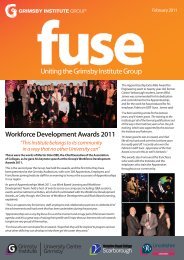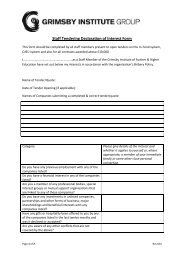Journal of Research & Scholarly Output 2006 - Grimsby Institute of ...
Journal of Research & Scholarly Output 2006 - Grimsby Institute of ...
Journal of Research & Scholarly Output 2006 - Grimsby Institute of ...
You also want an ePaper? Increase the reach of your titles
YUMPU automatically turns print PDFs into web optimized ePapers that Google loves.
are already showing real economic and<br />
quality benefits to the participating<br />
businesses. The CoVE has also been<br />
successful in driving new product<br />
development projects in the Humber region<br />
through the provision <strong>of</strong> training support in<br />
new-product development and utilisation <strong>of</strong><br />
the dedicated new product development<br />
lower than the EU, USA and Japan in terms<br />
<strong>of</strong> operational effective efficiency. Key areas<br />
for improvement were identified as<br />
changeover times, downtime, output rates,<br />
wastes & skills shortages. These problems<br />
are <strong>of</strong> particular significance when the<br />
importance <strong>of</strong> food manufacturing to the<br />
local economy is considered.<br />
centre.<br />
Keywords:<br />
fish, manufacturing, training, improvement,<br />
s<strong>of</strong>tware<br />
Employment within the ‘Manufacture <strong>of</strong><br />
Food Products & Beverages’ sector<br />
constitutes 16.3% <strong>of</strong> employment in North<br />
East Lincolnshire, 5% in Hull and 5.8% in<br />
Skill gaps in modern fish manufacturing<br />
North Lincolnshire. There is a manufacturing<br />
cluster within the Humber region that<br />
In fish products manufacturing, the work<br />
force undertakes daily operations that have<br />
become increasingly complex. Fish<br />
products manufacturing is a labour intensive<br />
sector and is therefore heavily reliant on the<br />
effectiveness <strong>of</strong> its human resources to<br />
underpin business productivity. This<br />
weighted reliance on personnel creates a<br />
represents 8.2% <strong>of</strong> local employment or<br />
over 23 000 jobs. The relative size <strong>of</strong> the<br />
labour market also has a bearing, with food<br />
commonly identified as a key strategic<br />
sector for support through both the Humber<br />
Sub-Regional Economic Strategy and the<br />
Regional Development Agency’s Cluster<br />
Strategy.<br />
need for higher skilled operatives and<br />
technicians.<br />
The relative deficit <strong>of</strong> Level 3 (pre-degree)<br />
skills within the food sector points to the<br />
The competitiveness <strong>of</strong> the UK Food<br />
Manufacturing Industry is currently a major<br />
concern. An International Benchmarking<br />
Study (FDNTO, 1998) found that the UK<br />
food industry is on average nearly 10%<br />
need for training. There is a particular need<br />
for higher level craft and technical skills<br />
provision in order to underpin overall<br />
operational effectiveness and efficiency<br />
within the sector. The food sector, in<br />
We would like to acknowledge our partner institutes who are working with us on these<br />
projects. North Lindsey College are researching and implementing Business improvement<br />
skills programmes and Hull College are leading on Engineering Maintenance. Further the<br />
Learning and Skills Council have actively supported the project financially and<br />
operationally.<br />
Mick Lochran - Assistant Director <strong>of</strong> Applied Learning, Skills and Technology,<br />
North Lindsey College<br />
Brian Smith - Project Manager, North Lindsey College<br />
Graham Towse - Director <strong>of</strong> Learning (programmes), Hull College<br />
Dave Dyble - Work Based Learning Co-ordinator, Hull College<br />
Ruth Palmer - Learning and Skills Council, Humber<br />
Page 60<br />
FOCUS

















